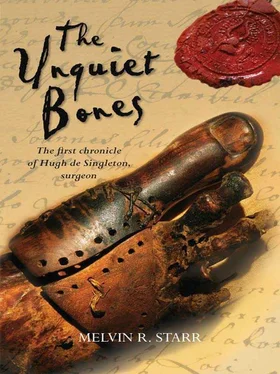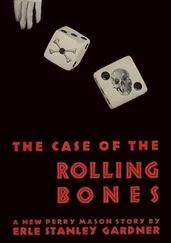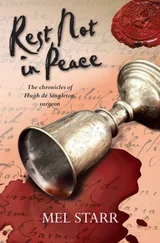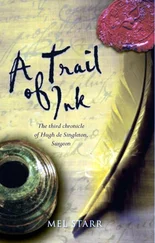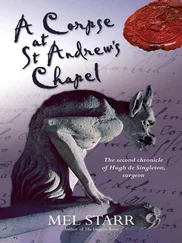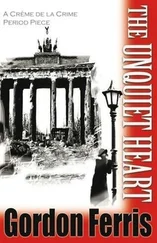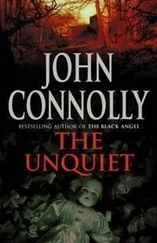Mel Starr - The Unquiet Bones
Здесь есть возможность читать онлайн «Mel Starr - The Unquiet Bones» весь текст электронной книги совершенно бесплатно (целиком полную версию без сокращений). В некоторых случаях можно слушать аудио, скачать через торрент в формате fb2 и присутствует краткое содержание. Год выпуска: 2008, Издательство: Kregel Publications, Жанр: Исторический детектив, на английском языке. Описание произведения, (предисловие) а так же отзывы посетителей доступны на портале библиотеки ЛибКат.
- Название:The Unquiet Bones
- Автор:
- Издательство:Kregel Publications
- Жанр:
- Год:2008
- ISBN:нет данных
- Рейтинг книги:4 / 5. Голосов: 1
-
Избранное:Добавить в избранное
- Отзывы:
-
Ваша оценка:
- 80
- 1
- 2
- 3
- 4
- 5
The Unquiet Bones: краткое содержание, описание и аннотация
Предлагаем к чтению аннотацию, описание, краткое содержание или предисловие (зависит от того, что написал сам автор книги «The Unquiet Bones»). Если вы не нашли необходимую информацию о книге — напишите в комментариях, мы постараемся отыскать её.
The Unquiet Bones — читать онлайн бесплатно полную книгу (весь текст) целиком
Ниже представлен текст книги, разбитый по страницам. Система сохранения места последней прочитанной страницы, позволяет с удобством читать онлайн бесплатно книгу «The Unquiet Bones», без необходимости каждый раз заново искать на чём Вы остановились. Поставьте закладку, и сможете в любой момент перейти на страницу, на которой закончили чтение.
Интервал:
Закладка:
Although I am the son of a landed knight — all right, not much land — I hold no manor. Our stations were too far apart for me to hold dreams of holding Lady Joan.
I had seen her rarely in the month I’d lived in Bampton. I heard it spoken about the town that shortly after Sir Robert’s disappearance, she journeyed to Exeter, and there spent the summer with her cousin, Lady Alice Boteler. She returned at Michaelmas, at near the same time my employment in the town began. Village gossips soon had it that the visit to Exeter was a failure, its purpose being to introduce m’lady to available young gentlemen of the appropriate station.
Numerous reasons were given for this miscarriage: Lady Joan was too opinionated, she was too demanding, she was shrewish, she thought too highly of herself. Whether any of this was true, I knew not. But no one ever spoke of her appearance as the cause of her failure to find a husband, if indeed she sought one.
I watched her walk across the castle yard and was reminded again that a wife would be a good thing to have. Any man would think the same, whatever his rank, when he beheld Lady Joan, coming or going.
Mooning over the unobtainable would not get me to Aston or Cote, although as it turned out, I might have remained in the castle yard, for all the good a horseback ride did me that day. Thomas must have recalled my riding skills, for he had the marshalsea prepare for me an elderly gelding of wide back and gentle demeanor.
“Bruce, we calls ’im,” the stableman told me. “Lord Gilbert rode ’im at Poitiers, he did. Took a bolt in the haunch, but never so much as flinched. Lord Gilbert didn’t know as he’d been hurt ’til battle was over.”
The stableman held the horse’s head and scratched his forelock while I mounted. Four hours later Bruce and I ambled through the gate with barely enough light to see that Wilfred had not yet swung it shut nor dropped the portcullis. Waiting for my return, he said, as I greeted him.
No one, male or female, was missing from Aston or Cote. Not missing for unknown cause, anyway. There were so many missing from plague that the old woman who spoke to me in Cote suggested that the families who remained might petition their lord to remove to Newbridge or some other town less decimated by disease.
I planned to visit other villages to the east of Bampton the next day, but this was not to be. Shortly after I rose from my bed, before I completed my morning wash — I know many consider this an unnecessary affectation — there came a pounding at the door of Galen House.
I opened it and peered into the gloom. Before me stood three men, two of them carrying a litter upon which a fourth was lying. Motionless.
The door-thumper removed his hat and explained their mission. The man on the litter was his father. They were foresters in Lord Gilbert’s lands to the northwest of Bampton. At dusk the evening before, they had felled a last oak for the day. The man on the litter had not seen it coming his way as it dropped until it was too late. A large limb had caught him across the head as he ran, leaving him unconscious, and leaving a dent in his skull as well as a laceration. He had regained consciousness briefly, complained of headache and nausea, then, after they got him to his wife and hut, he’d passed out again. And this time remained comatose. I motioned for them to bring him in. Fortunately I had thought to repackage the bones and move my dispensary table to its rightful place. The sight of a surgeon’s table strewn with bones might put off even the most needy client.
“Put the litter on the table there.”
I lit two more candles — one was already burning — and inspected the wound. It was depressed to the depth of my finger and yet oozing blood.
“Can you do aught for ’im?” the son asked, his cap still grasped tightly before him.
“Perhaps. You would have done well to have brought him to me last night.”
“’E woke up for a span. ’Is wife wanted us to bring ’im in, but ’e said ‘No.’ Worried ’bout t’expense, y’see. So when he went down again we thought ’twas but for a minute, like. But he hasn’t wakened yet, an’ seems to me he ain’t breathin’ right.”
He wasn’t. I told the son and the other bearers I would do what I could, but I was not optimistic. For what I must do I wanted no spectators. I sent my patient’s three companions to wait in the street. The injured man remained comatose, which was good. He would feel no pain, nor thrash about.
I heated water and shaved the indented part of the skull, and a circle around it, then bathed the wound with the last of my wine. I used the scalp laceration for the cross-stroke, and made two vertical incisions at either end. This created two flaps of scalp which I could fold back to reveal the fracture.
I caught my breath when I saw the extent of the damage. The fracture was a finger’s length in diameter, and included four large bone fragments and many small splinters. I employed a probe to lift the largest piece, and in the gathering light from my eastern window I peered beneath it.
I was cheered to see that the damage was not so severe as the broken skull would have it appear. I saw no great rupture of dura mater encompassing the brain. There was much coagulated blood under the break, but that could be teased out, with time and care.
So I took my time and was careful. Three hours later I had cleaned the smallest bone splinters from the wound, positioned the larger pieces in a convex curve to match the undamaged portion of skull, and sewed up the “H” flap of scalp. My back ached and sweat ran into my eyes, but a sense of accomplishment overwhelmed my discomfort. The man might not survive, but he had not died on my table. At least, not yet. And I had given him a chance to live.
I packed ground moneywort over the wound, wrapped the woodcutter’s head in several layers of linen strips, then called to his son and friends. They had remained standing, motionless, since the moment I sent them out, and it was now past the sixth hour. I had seen them through the window several times while I worked.
“Take him home carefully. It will be his life should he receive another blow on the head. He must not rise from his bed for a week. After seven days he may rise but to eat and care for himself. No labor! In a fortnight he must return to have the wound inspected and have the windings changed.”
“He will live, then?” asked the brother.
“He may. I cannot pledge. The fracture was severe.”
“When can he return to work?”
“Perhaps a month. Certainly it will not be safe to do so sooner.”
“What is your fee?”
A wage for men like these might be two pence per day. I asked for four pence, brain surgery being somewhat more skilled employment than woodcutting and, from the stiffness of my back, nearly as arduous.
“I’ve but t’uppence. He’ll bring two more in a fortnight. If God wills an’ he lives.”
Fair enough, I thought. Success should be worth more than failure.
I was weary from the morning’s labor, and had no heart for another unfruitful journey through the autumn countryside. I had used much white archangel and moneywort to staunch the bleeding of the woodman’s scalp, and knew a meadow north of town where I might replenish my supply.
The afternoon I spent gathering plants; white archangel, lady’s mantle, clover, moneywort, and betony. All these I did not find in the same field, but since the plague much land lay fallow. Brief journeys from meadow to meadow supplied all my needs. I hung my gathered medicines from beams in the dispensary to dry.
I sat and contemplated this room as the day died. Tomorrow I would resume my search. Tonight I would enjoy the quiet reward of a day lived well, work well done, and the pleasure of searching God’s forest and field for the tools he has provided whereby we may be healed of our afflictions. I concluded the day with maslin, a haunch of cold mutton, and a pint of the baker’s wife’s ale. Life was good.
Читать дальшеИнтервал:
Закладка:
Похожие книги на «The Unquiet Bones»
Представляем Вашему вниманию похожие книги на «The Unquiet Bones» списком для выбора. Мы отобрали схожую по названию и смыслу литературу в надежде предоставить читателям больше вариантов отыскать новые, интересные, ещё непрочитанные произведения.
Обсуждение, отзывы о книге «The Unquiet Bones» и просто собственные мнения читателей. Оставьте ваши комментарии, напишите, что Вы думаете о произведении, его смысле или главных героях. Укажите что конкретно понравилось, а что нет, и почему Вы так считаете.
